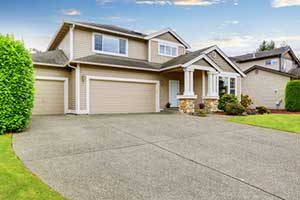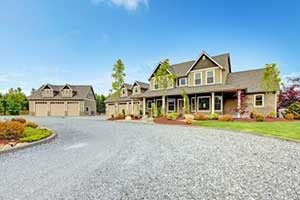When it comes to home maintenance, we often focus on interior features like kitchens, bathrooms, and living spaces, or exterior elements such as landscaping and roofing. However, one essential aspect that is frequently overlooked is the driveway. Despite being one of the first things that visitors or potential buyers see when they arrive, driveways are often neglected. A well-maintained driveway not only enhances the curb appeal of your home but also adds to its overall value and functionality.
Let’s explore the different types of driveways, their benefits, and how to maintain them to ensure your home remains up-to-date and attractive.
Types of Driveways
 Driveways come in various materials, each with its own advantages and disadvantages. The choice of material depends on factors such as budget, climate, and aesthetic preferences. Here’s a closer look at some of the most popular driveway options.
Driveways come in various materials, each with its own advantages and disadvantages. The choice of material depends on factors such as budget, climate, and aesthetic preferences. Here’s a closer look at some of the most popular driveway options.
Concrete Driveways
Concrete driveways are a popular choice for many homeowners, and for good reason. Concrete is relatively inexpensive, durable, and can last for decades with proper maintenance. One of the major advantages of concrete is its versatility—modern advancements have made it possible to customize concrete driveways with different colors, textures, and patterns, allowing homeowners to achieve a look that complements their home’s exterior.
However, concrete does have its drawbacks. It is not stain-resistant, so oil leaks or spills from vehicles can leave unsightly marks if not cleaned promptly. Additionally, concrete is prone to cracking in areas with extremely cold temperatures. The freeze-thaw cycle can cause the material to expand and contract, leading to cracks over time. Despite these challenges, concrete remains a top choice for driveways due to its durability and cost-effectiveness.
Asphalt Driveways
Asphalt, another common material for driveways, is composed of sand, rock, and asphalt cement. It’s often chosen for its affordability and ease of installation. The classic black color of asphalt driveways provides a sleek and modern look, but like concrete, asphalt can be customized to create a unique appearance.
One significant advantage of asphalt is its ability to withstand colder climates better than concrete. Asphalt is more flexible, making it less likely to crack under the pressure of freezing temperatures. However, it does require regular maintenance, as it is prone to cracking and potholes over time. To keep an asphalt driveway in good condition, it needs to be resealed every few years, which can add to the overall maintenance cost.
Brick Driveways
Brick driveways offer a timeless and elegant look that appeals to many homeowners. Although more expensive than concrete or asphalt, brick driveways can be customized with various patterns and colors, making each driveway unique. The durability of brick is another plus—it can withstand heavy traffic and harsh weather conditions, making it a solid investment for those willing to pay a premium.
The main drawback of brick driveways is the cost. Bricks are more expensive to purchase and install, and the installation process is more labor-intensive. However, the long-term benefits, such as durability and low maintenance, often outweigh the initial expense. For homeowners looking for a sophisticated and long-lasting driveway, brick is an excellent choice.
Other Driveway Options
While concrete, asphalt, and brick are the most common materials for driveways, there are several other options available, each with its own unique characteristics.
- Gravel Driveways: Gravel is a popular choice in rural areas due to its low cost—sometimes less than a dollar per square foot. Gravel driveways offer a rustic and natural look, but they require frequent maintenance. The loose nature of gravel means it can be displaced by weather or regular vehicle traffic, leading to a messy appearance. Regular raking and occasional replacement of the gravel are necessary to keep the driveway looking neat.
- Cobblestone Driveways: Cobblestone driveways exude a historic and charming vibe, often seen in older neighborhoods or homes with a rustic aesthetic. Cobblestones are incredibly durable and age beautifully, with the material often looking better as it wears. However, this option is among the most expensive, costing up to seventy dollars per square foot. Despite the high cost, cobblestones provide a long-lasting and visually appealing driveway that adds significant character to a home.
- Grass and Green Driveways: For the environmentally conscious homeowner, grass and green driveways offer a sustainable alternative. These driveways typically consist of a grid or plastic base that allows grass to grow through, creating a natural and eco-friendly look. While they are an excellent way to reduce heat absorption and promote greenery, they do require regular maintenance to keep the grass healthy and trimmed. Additionally, this option may not be suitable for areas with heavy vehicle traffic.
Maintaining Your Driveway
No matter the type of driveway you choose, regular maintenance is essential to keep it looking its best and prolong its lifespan. Each material requires specific care, but there are general tips that apply to all driveway types.
General Maintenance Tips
- Remove Stains Promptly: Whether it’s oil, gasoline, or another substance, stains can quickly become permanent if not addressed immediately. Use appropriate cleaners for the material of your driveway to remove any spills or stains as soon as they occur.
- Avoid Deicing Chemicals: While it might be tempting to use deicing chemicals during winter, they can cause significant damage to your driveway. Chemicals like rock salt can erode concrete and asphalt, leading to cracks and surface deterioration. Instead, opt for sand or kitty litter to provide traction without damaging the surface.
- Limit Heavy Vehicle Traffic: Large trucks or heavy machinery can put undue stress on your driveway, leading to cracks and other damage. If possible, park heavy vehicles elsewhere or limit their time on the driveway.
- Be Cautious with Snow Plows: If you use a snow plow to clear your driveway, be careful not to scrape or damage the surface. Set the plow blade slightly above the surface to avoid gouging the material.
Specific Maintenance for Driveway Types
- Concrete Driveways: In addition to the general tips, concrete driveways should be sealed every 2-3 years to protect against stains and weather damage. Sealing also helps prevent water from penetrating the surface, reducing the risk of cracks during freeze-thaw cycles.

- Asphalt Driveways: Asphalt driveways require resealing every 3-5 years to maintain their durability and appearance. Fill any cracks or potholes as soon as they appear to prevent further damage.
- Brick Driveways: Brick driveways are relatively low-maintenance but should be inspected regularly for loose or cracked bricks. Replace damaged bricks promptly to prevent shifting or uneven surfaces.
- Gravel Driveways: Regular raking is necessary to keep a gravel driveway even and tidy. You may need to add additional gravel every few years to replace any that has been displaced.
- Cobblestone Driveways: Cobblestones require minimal maintenance, but weeds can grow between the stones over time. Regularly weed and clean the gaps to keep the driveway looking pristine.
- Grass and Green Driveways: Keep the grass well-maintained by mowing regularly and ensuring it receives adequate water. You may need to reseed any areas where the grass has become sparse.
Get in Touch with Northern Virginia’s Driveway Specialists
Your driveway plays a vital role in maintaining the appearance and value of your home. By selecting the right materials and ensuring regular upkeep, you can keep this often-overlooked feature in prime condition.
Whether you’re interested in the durability of concrete, the sophistication of brick, or the sustainability of a green driveway, proper care will enhance your home’s curb appeal and leave a lasting impression. Trust the experts at Dirt Connections to help you choose and maintain the perfect driveway for your home. Contact us today to get started on preserving and enhancing this essential part of your property.








































